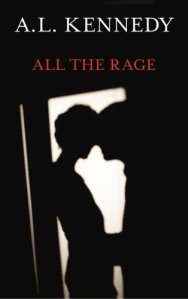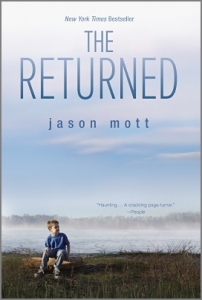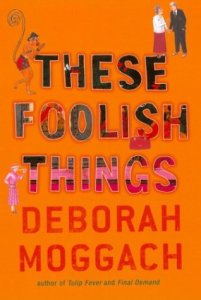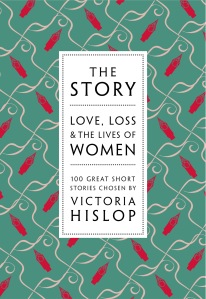What a treat is All the Rage. Twelve stories about love by the inimitable AL Kennedy. Love: looking for it, losing it, exploring what love is. Instead of describing the stories, I want to celebrate her writing. The way she tells us so much in just one or two sentences.  ‘Late in Life’ features an older couple waiting. They are waiting in a queue at the building society, waiting for him to pay off her mortgage, in a coming-together of two lives. She provocatively eats a fig, being sexy for him “to pass the time.” Despite his hatred of public show, he watches her, “he is now-and-then watching.” He gives her “the quiet rise of what would be a smile if he allowed it. She knows this because she knows him and his habits and the way the colour in his eyes can deepen when he’s glad, can be nearly purple with feeling glad when nothing else about him shows a heat of any kind.”
‘Late in Life’ features an older couple waiting. They are waiting in a queue at the building society, waiting for him to pay off her mortgage, in a coming-together of two lives. She provocatively eats a fig, being sexy for him “to pass the time.” Despite his hatred of public show, he watches her, “he is now-and-then watching.” He gives her “the quiet rise of what would be a smile if he allowed it. She knows this because she knows him and his habits and the way the colour in his eyes can deepen when he’s glad, can be nearly purple with feeling glad when nothing else about him shows a heat of any kind.”
In ‘The Practice of Mercy’, Dorothy is lost, alone and approaching old age and contemplating her relationship. “She realised once more, kept realising, as if the information wouldn’t stick, realised again how likely it was that someone you’d given the opening of leaving, someone you’d said was free to go, that someone might not discover a way to come back.”
‘All the Rage’ is set on a train platform. A couple are delayed, travelling home from Wales, stuck waiting for a train that never comes. Kennedy tells us everything about their relationship by describing their suitcase. “Inside it, their belongings didn’t mix – his shirts and underpants in a tangle, Pauline’s laundry compressed into subsidiary containments. They had separate sponge bags too. Got to keep those toothbrushes apart.”
Simon, the narrator of ‘Run Catch Run’, considers his unnamed dog, he is at once a child teaching his puppy and also an adult with a mature awareness of inevitability. “His dad had suggested she could be called Pat, which was a joke: Pat the dog. Simon didn’t want to make his dog a joke.”
She shows us so much, in so few sentences.
CLICK HERE TO READ MORE ABOUT THIS BOOK
And click the title to read my reviews of these other AL Kennedy books:-
DAY
ON WRITING
SERIOUS SWEET
If you like this, try:-
‘The Story’ ed. Victoria Hislop
‘An Unfamiliar Landscape’ by Amanda Huggins
‘Last Stories’ by William Trevor
And if you’d like to tweet a link to THIS post, here’s my suggested tweet:
#BookReview ALL THE RAGE by AL Kennedy @Writerer via @SandraDanby http://wp.me/p5gEM4-NL



![deborah moggach - these foolish things 10-6-13 [1 pic]](https://sandradanby.files.wordpress.com/2013/06/deborah-moggach-these-foolish-things-10-6-13-1-pic.jpg?w=106&h=150)


 “It began to rain as he entered the park, but not hard enough to make him look round for a taxi. Emerging from the station, he had been tempted by a pale gleam of sunshine, sufficient to convince him of the physical benefits of walking. He needed exercise, he had decided, just as he needed fewer cigarettes and less alcohol: it was pathetic how the habits of sloth and self-indulgence crept up unnoticed, along with middle age, that unbecoming state which you did not even recognize until events brought it sharply and unkindly home to you. And now the fine spring rain, for her first day back. He pictured her with painful tenderness, suntanned and shivering, getting ready for college in the unfamiliar flat. Was he too late? Would she still be there by the time he was able to phone? He had left home an hour ahead, under Cassie’s indulgent eyes, to catch an earlier train, feeling he could only telephone properly from the office, yet not knowing what he could possibly find to say that would be sufficiently casual when he finally heard her voice.”
“It began to rain as he entered the park, but not hard enough to make him look round for a taxi. Emerging from the station, he had been tempted by a pale gleam of sunshine, sufficient to convince him of the physical benefits of walking. He needed exercise, he had decided, just as he needed fewer cigarettes and less alcohol: it was pathetic how the habits of sloth and self-indulgence crept up unnoticed, along with middle age, that unbecoming state which you did not even recognize until events brought it sharply and unkindly home to you. And now the fine spring rain, for her first day back. He pictured her with painful tenderness, suntanned and shivering, getting ready for college in the unfamiliar flat. Was he too late? Would she still be there by the time he was able to phone? He had left home an hour ahead, under Cassie’s indulgent eyes, to catch an earlier train, feeling he could only telephone properly from the office, yet not knowing what he could possibly find to say that would be sufficiently casual when he finally heard her voice.”
